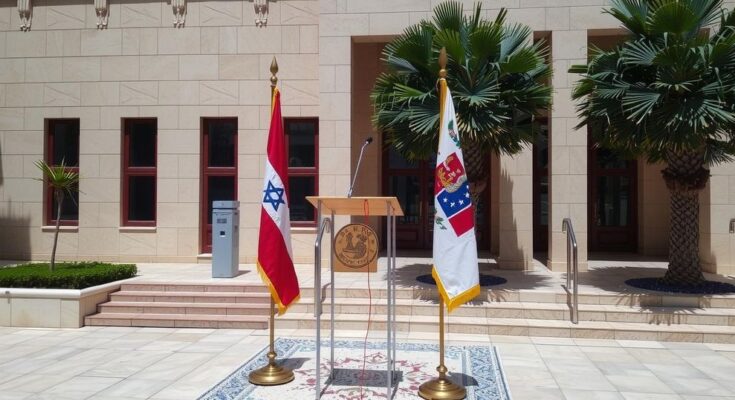Paraguay has reopened its embassy in Jerusalem, recognizing the city as Israel’s capital. This marks a significant diplomatic step, especially in the context of recent Middle Eastern conflicts. The move places Paraguay among a few nations that have made such a decision, following prior shifts in its foreign policy. Additionally, U.S. officials comment on changing dynamics post-ceasefire in Lebanon, suggesting implications for negotiations regarding Gaza.
On Thursday, Paraguay officially reopened its embassy in Jerusalem, marking a significant step in its recognition of the city as Israel’s capital. This action follows Paraguay’s original decision to move its embassy to Jerusalem in 2018 during Horacio Cartes’ presidency, which was subsequently reversed under new leadership. President Santiago Peña’s recent initiative makes Paraguay the first nation to take this step since the Hamas-led attack on October 7 triggered ongoing conflict in the region. With this development, Paraguay joins a selective group of countries, including the United States and Guatemala, in solidifying diplomatic relations with Israel from its designated capital.
President Biden’s national security adviser, Jake Sullivan, discussed the implications of the evolving geopolitical landscape in the Middle East, particularly the ceasefire achieved in Lebanon that may assist in negotiating peace efforts in Gaza. Sullivan elaborated on how Israel’s strategic gains have altered the dynamics, noting that “Hamas’ posture at the negotiating table did adapt” following Israel’s offensive actions.
Sullivan further emphasized the changing nature of the Middle East, stating, “We are now faced with a dramatically reshaped Middle East in which Israel is stronger, Iran is weaker, its proxies decimated, and a ceasefire that is new and will be lasting in Lebanon that ensures Israel’s security over the long term.” This transformation sets the stage for potential future negotiations and agreements as the region continues to navigate complex political challenges.
The reopening of Paraguay’s embassy in Jerusalem relates to the ongoing global debate surrounding the recognition of Jerusalem as Israel’s capital. Amidst fluctuating international relations post-2018, several nations made landmark decisions to adjust their diplomatic recognition in light of Israel’s political landscape. Notably, the 2023 decision by President Santiago Peña underscores Paraguay’s commitment to aligning its foreign policy with Israel’s interests. The context includes political shifts within Paraguay and broader regional tensions involving Israel and its neighbors.
In conclusion, Paraguay’s decision to reopen its embassy in Jerusalem reaffirms its recognition of the city as Israel’s capital, aligning it with a select group of nations. This move is significant not only for Paraguay but also within the context of ongoing geopolitical developments in the Middle East. With the potential for future negotiations on peace, the regional dynamics are rapidly evolving, reflecting broader implications for international relations in the area.
Original Source: www.reviewjournal.com




